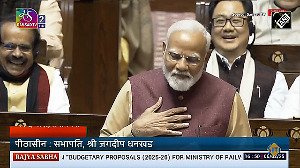The country needs to put in some extra effort to fix its infrastructure deficit, which is crucial to achieve 9 per cent growth target during the Eleventh Plan (2007-12), Planning Commission Deputy Chairman Montek Singh Ahluwalia said today while participating in a discussion on "10 per cent growth: The Infrastructure Picture" at the India Economic Summit 2007 in New Delhi.
"Infrastructure is a critical constraint to growth and we are worried about it. We can not achieve 9 per cent growth unless we put in some extra effort in infrastructure," Ahluwalia said.
India currently invests 5 per cent of GDP in infrastructure and aims to increase it to 9 per cent by the end of the Eleventh Plan period.
The Planning Commission has set a target of investing $500 billion in the infrastructure sector during the Eleventh Plan. "Of the $500 billion investment requirement, 30 per cent ($150 billion) will be brought in by the private sector. The public investment will focus mainly on irrigation and rural-based infrastructure which the private sector may not find attractive to invest in. However, the technological level in such projects have to be much higher," Ahluwalia said.
Ahluwalia further said if investment in infrastructure grew at the current rate, it will touch $350 billion investment in five year period. "The challenge is to attract $150 billion of investment," he added.
Holding that China had added more infrastructure than it needed, Ahluwalia said: "China's saving rate is 55 per cent of its GDP and investment rate is 45 per cent of its GDP. In India, the investment rate is 37 per cent of GDP." He said China had invested this extra 8 percentage point difference in investment mostly in the infrastructure sector. Ahluwalia also said state governments must allocate adequate amount of their budget to local authorities. "Local governments should also raise their own resources," he added.
Speaking at the same session, Rajiv Lall, MD and CEO, IDFC said, "There is more or less enough saving in India to finance infrastructure in the country. The challenge is how to source it. So far only the bank savings have been tapped. We need to tap the pension and insurance sectors to fund infrastructure."
Admitting that the present sectors were facing skill shortages, Lall said, "I am sure in a market clearing economy like India this gap will shrink in three to four years time."
However, he said, the country needed to improve the speed of governance and solve issues regarding land acquisition.
Rajat M Nag, managing director-general, Asian Development Bank said: "According to our estimates, India needs to contribute 10.9 to 12.5 per cent of GDP on infrastructure including maintenance. Thus India will need to invest $1.4- to $1.6 billion in infrastructure within 10 years period."
Claiming the policy framework was better in India now, he said the emphasis should be on implementation. "So long as political will is there, I am sure, India can be a leader in PPP," he said.







 © 2025
© 2025